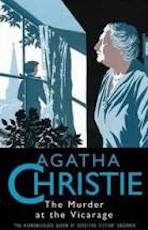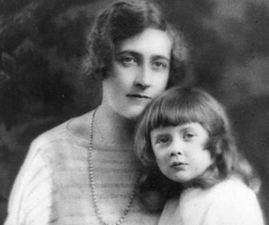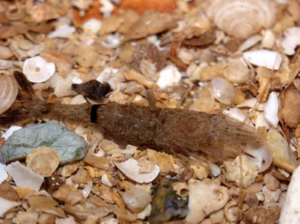
Poirot Score: 67
The Murder at the Vicarage
☆☆☆
Reasons for the Poirot Score
The first Miss Marple novel. A most engaging character. Lots of plot twists and Christie’s humour and story telling technique as good as ever. A great read. The clues, however, are scant and there are more red herrings than clues with the result that the solution is somewhat arbitrary: several alternative solutions are equally plausible.
Click here for full review (spoilers ahead)
Trivia
Dedication
To Rosalind.
Rosalind was Agatha Christie’s only child. Rosalind’s father was Christie’s first husband, Archie Christie. Rosalind was born in 1919 and died aged 85 in 2004. Her first husband, Hubert Prichard, was killed in the Second World War in 1944. They had a son, Mathew. Rosalind remarried Anthony Hicks, a trained barrister, in 1949.
Agatha Chrisie with her daughter Rosalind,In the early 1920’s.
[http://oztypewriter.blogspot.co.uk/2013/02/have-typewriter-will-travel-iv.html]
The Case of the Picked Shrimps
In chapter 11 Griselda, the vicar’s wife, says: ‘I wish you’d solve the case, Miss Marple, like you did the time Miss Wetherby’s gill of picked shrimps disappeared’. In The Tuesday Night Club, a short story first published in 1927 in The Royal Magazine three years before Vicarage was published, Miss Marple says: ‘Mrs Carruthers had a very strange experience yesterday morning. She bought two gills of picked shrimps at Elliot’s. .. when she got home she found she had not got the shrimps with her … these shrimps had completely disappeared. Now that seems to me very remarkable.’
It seems unlikely that Miss Marple was involved in two episodes of missing picked shrimps in which case how are we to account for the differences in these accounts? Perhaps Mrs Carruthers changed her name to Miss Wetherby, for example returning to her maiden name after her husband divorced her, or died. But that would have been a very unusual thing to do at the time. More likely, Griselda had misremembered whose picked shrimps they had been. There is a remote possibility that Miss Marple misremembered.
Shrimps, of course, is the British English meaning, not the US English meaning. The word refers to a number of small marine ten-legged crustaceae, normally transparent when living although able to take on the colour of their surrounds, for camouflage. They turn brown when cooked. Most are of the Cragnon genus.
In British English the majority of what are called shrimps in the US – larger than British shrimps and the kind you buy in supermarkets and fishmongers – are called prawns. Picked shrimps are cleaned and peeled. A gill (pronounced like the name Jill) is a measure of volume: a quarter of a pint (i.e. 5 fluid ounces, or about 140 mls)
A shrimp (British English usage)
[Photo: John Rundle:
http://www.marlin.ac.uk/taxonomyidentification.php?speciesID=3078]
Miss Marple’s first real murder case?
In chapter 26 Miss Marple refers to her success at solving relatively insignificant mysteries and then says: ‘I have always wondered whether, if some day a really big mystery came along, I should be able to do the same thing. I mean – just solve it correctly.’ She appears to have forgotten that she has already solved the murder of her niece’s husband in The Thumb Mark of St Peter – a short story first published in The Royal Magazine in 1928, two years before Vicarage. The story was republished in The Thirteen Problems in 1932.
St Mary Mead
Miss Marple lives in St Mary Mead. This is in the fictitious county of Downshire. The name first appears in the short story, The Tuesday Night Club, which was published in a magazine (The Royal Magazine) in 1927 before appearing in book form as the first of The Thirteen Problems in 1932. It does not seem to be the same St Mary Mead where Katherine Grey lives in The Mystery of the Blue Train (published 1928) and which is placed in the real county of Kent (see Blue Train blog trivia).
Peculations
Colonel Protheroe, in a letter to the vicar, says that the letter concerns ‘recent peculations’. There is no missing initial ‘s’. Peculations are ‘the appropriation of public money or property by one in an official position’ from the Latin, to embezzle (Oxford English Dictionary).
Maxim Silencer
In chapter 30 Miss Marple says: ‘There is, I believe, an invention called a Maxim silencer. So I gather from detective stories.’ Hiram Percy Maxim is credited with inventing the gun silencer and patented his invention in 1909. Similar mechanisms are used in car silencers (mufflers). Hiram’s father (Hiram Stevens Maxim) invented the first fully automatic machine gun. Although American born Hiram Stevens is buried in West Norwood cemetry in South London. I used to walk past this cemetry every day on my way to and from school.
Cross-section of the Maxim Silencer
[http://www.silencerco.com/?section=Education&page=History]
Encephalitis lethargica
In what seems a significant breach of confidentiality, Haydock, the local doctor, tells the vicar that Hawes, the curate, has suffered Encephalitis Lethargica (chapter 14). There was an epidemic of this disease during and after the First World War. It may have been the result of a pathological immune reaction to infection. It could cause a number of neurological symptoms (change of ‘moral’ character is mentioned by Dr Haydock). Oliver Sacks’ book Awakenings is an account of patients who had long-lasting severe Parkinsonian symptoms that were to some extent relieved by L-DOPA.




